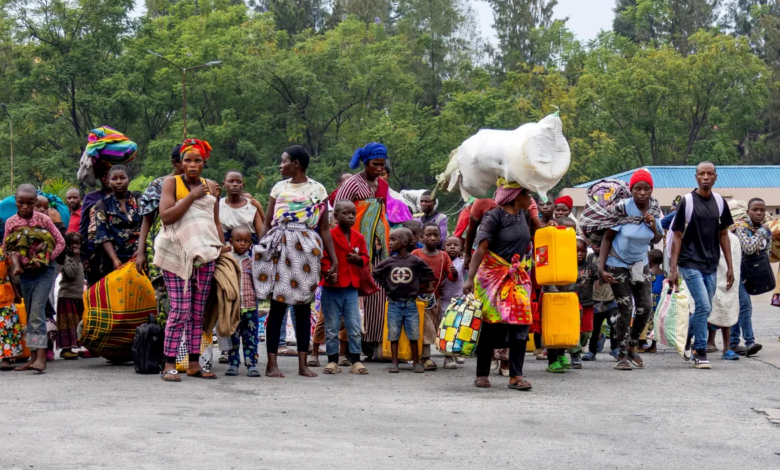M23 Rebels on Looting Spree in DR Congo after Goma Capture
The Independent National Electoral Commission in Congo also accused members of the Rwandan army and their M23 supporters of looting the Provincial Executive Secretariat facilities and warehouses in Goma.

Since capturing the North Kivu provincial capital of Goma from the Democratic Republic of Congo army, the M23 rebels have begun a systematic house raiding, looting, illegally occupying private places and seizing vehicles belonging to international humanitarian organisations.
The United Nations (UN) spokesperson, Stephane Dujarric, told journalists during a press briefing that they have received reports of M23 rebels consolidating their presence in Goma through regular patrols and the search of houses.
“Acts of looting and the occupations of private residences by the armed group have been reported as well as attempts to seize vehicles, including those belonging to humanitarian organisations – which constitutes a violation of international humanitarian law,” Dujarric declared.
According to the UN, the humanitarian situation in the city remains critical. Mortuaries are saturated and health facilities are full and running over with wounded persons while the population continues to depend on untreated water from Lake Kivu which increases the risks of water-borne diseases.
On the war front, M23 fighters continue their push to South Kivu notably around Minova where the DR Congo army has reinforced its positions in Nyabibwe, which is 85 kilometres from Bukavu. The UN has reiterated its appeal for the respect of international humanitarian law and demands access without restrictions to populations affected by the conflict.
The Independent National Electoral Commission in Congo also accused “members of the Rwandan army and their M23 supporters” of looting the Provincial Executive Secretariat facilities and warehouses in Goma.
The culprits allegedly took vehicles, motorcycles, and electoral kits from Goma to neighbouring Rwanda, and took hostage some of the commission’s agents in North Kivu. The commission strongly condemned the actions and demanded the immediate release of its agents. The body also called on national authorities and the international community to address the loss of electoral materials.
Rwanda has yet to respond to the allegations.
However, the United Nations World Food Programme (WFP) expressed disquiet over the possibility of a humanitarian disaster following the looting of relief stocks in Congo. Several tons of foodstuff intended to help vulnerable families were looted in its stores by the Rwanda-backed M23 rebels.
The looted stocks are maize flour, vegetable oil, beans, biscuits, peas, iodised salt and food supplements necessary for patients suffering from malnutrition as well as for children and pregnant or breastfeeding women.
“The looting deliberately deprives this category of the vulnerable population of their fundamental right to adequate feeding. Each quantity of food stolen represents a meal less for a family needing food assistance,” the WFP claimed in a statement, noting that the scarcity of these products has occasioned a rise in prices, rendering access to food more difficult for persons in need.
Due to the extension of the fighting in North and South Kivu, the WFP has announced the suspension of operations in the zones situated inside or near the front lines to ensure the safety of its personnel.
“WFP prepositions stocks according to the resources available to resume when the situation permits given that the immediate needs could be important,” the WFP communique explained, adding that the programme needs $410 million to provide necessary food assistance and vital nutrition in DR Congo.
The M23 rebels, after capturing Goma in North Kivu, have engaged in systematic raids, looting, and vehicle seizures, affecting international humanitarian organizations. Reports confirm their increased patrols and house searches, violating international humanitarian law. The UN highlights the critical humanitarian situation in Goma, with overstretched health facilities and sanitation issues, exacerbating water-borne disease risks. The rebels continue to advance towards South Kivu as the UN demands unimpeded access to affected areas and adherence to humanitarian law.
The Congolese Electoral Commission accuses the Rwandan army and M23 of looting electoral facilities and taking hostages, demanding the release of captured personnel and intervention on lost electoral materials. Meanwhile, the UN World Food Programme warns of a looming humanitarian crisis after relief stocks were looted, impacting food availability for vulnerable groups. The situation has led to a suspension of WFP operations near conflict zones, with a continued need for funding to support food and nutrition assistance in the Democratic Republic of the Congo.
Support Our Journalism
There are millions of ordinary people affected by conflict in Africa whose stories are missing in the mainstream media. HumAngle is determined to tell those challenging and under-reported stories, hoping that the people impacted by these conflicts will find the safety and security they deserve.
To ensure that we continue to provide public service coverage, we have a small favour to ask you. We want you to be part of our journalistic endeavour by contributing a token to us.
Your donation will further promote a robust, free, and independent media.
Donate HereStay Closer To The Stories That Matter




